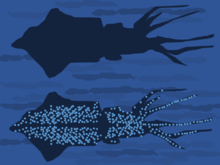Watasenia scintillans
| Sparkling enope squid | |
|---|---|
 | |
| Scientific classification | |
| Kingdom: | Animalia |
| Phylum: | Mollusca |
| Class: | Cephalopoda |
| Order: | Teuthida |
| Family: | Enoploteuthidae |
| Genus: | Watasenia Ishikawa, 1914 |
| Species: | W. scintillans |
| Binomial name | |
| Watasenia scintillans (Berry, 1911) | |
Watasenia scintillans, also known as the sparkling enope squid or firefly squid, is a species of squid in the family Enoploteuthidae. It is the sole species in the genus Watasenia.
Bioluminescence
The sparkling enope squid is found in the Western Pacific ocean at depths of 183 to 366 metres (600–1200 feet) and is bioluminescent. Each tentacle has a photophore organ, which produces light. When flashed, the light attracts small fish, which the squid can feed upon.
This squid has three visual pigments located in different parts of the retina which likely allows color discrimination, each having distinct spectral sensitivities.[2]
The sparkling enope squid measures about 3 inches (7.6 cm) long at maturity and dies after one year of life. It has the standard eight arms and two tentacles, with one pair each having three, bright light-emitting organs at the tips.

The squid spends the day at depths of several hundred metres, returning to the surface when night falls. It uses its ability to sense and to produce light for counterillumination camouflage: it matches the brightness and colour of its underside to the light coming from the surface, making it difficult for predators to detect it from below.
Mating
The firefly squid can also light up its whole body to attract a mate. Once the squid's eggs have been fertilized and laid, it dies, having reached the end of its one year lifespan. The mating season lasts from March to June.
Commercial use
This squid is commercially fished in Japan, accounting for an annual catch of 4,804 to 6,822 tons from 1990 to 1999.[3]
See also
References
- ↑ Barratt, I. & Allcock, L. (2010). "Watasenia scintillans". IUCN Red List of Threatened Species. Version 2014.3. International Union for Conservation of Nature. Retrieved March 7, 2015.
- ↑ "Map of Life - 'Colour vision' in Firefly squid". Convergent Evolution Online. University of Cambridge. Retrieved 6 November 2012.
- ↑ Tsuchiya, Kotaro. 2007. Watasenia Ishikawa 1914. Watasenia scintillans. Version 16 June 2007 (under construction). http://tolweb.org/Watasenia_scintillans/19645/2007.06.16 in The Tree of Life Web Project, http://tolweb.org/
External links
| Wikimedia Commons has media related to Watasenia scintillans. |
Sources
Patel, K. and D. Pee 2011. "Watasenia scintillans" (On-line), Animal Diversity Web. Accessed October 9, 2016 at http://animaldiversity.org/accounts/Watasenia_scintillans/
